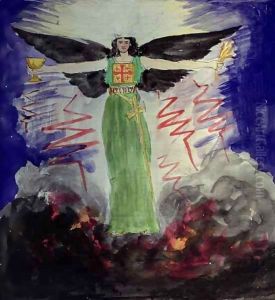W.A. Ayton Paintings
W.A. Ayton, born William Alexander Ayton in 1860, was a British artist whose work and contributions to the art world remain relatively obscure in the annals of art history. Unlike his contemporaries who gained widespread recognition, Ayton's journey as an artist was marked by a quiet dedication to his craft, with few records detailing his life or the breadth of his work. Despite the lack of widespread acknowledgment, those who have studied his pieces note a meticulous attention to detail and a passion for capturing the essence of his subjects, traits that defined his artistic career.
Ayton's life was one of modest beginnings, and he spent the majority of his career in the United Kingdom, navigating the evolving art scene of the late 19th and early 20th centuries. The period was characterized by rapid changes in artistic styles and movements, from Impressionism to the burgeoning Modernist movement. However, Ayton's work largely eschewed the trends of his time, focusing instead on a more traditional approach to art. His preference for realism and classical techniques set him apart from his peers, who were often more experimental in their endeavors.
Little is known about Ayton's training or the specific influences on his work, given the sparse documentation. However, it is evident from surviving pieces that he possessed a profound skill in both painting and drawing, with a particular affinity for landscapes and portraiture. His landscapes capture the serene beauty of the British countryside, while his portraits offer a glimpse into the character and inner life of his subjects, suggesting a deep empathy and understanding of the human condition.
Despite his talents, Ayton never achieved significant commercial success during his lifetime, and his works were seldom exhibited in the major galleries or salons that could have elevated his status in the art world. It was only posthumously that a greater appreciation for his contributions began to emerge, as art historians and collectors started to recognize the quiet brilliance of his work.
William Alexander Ayton passed away in 1937, leaving behind a modest but meaningful legacy. Today, his artwork is cherished by a small but dedicated group of aficionados who appreciate the understated elegance and emotional depth of his creations. While he may not have been a luminary in the art world during his lifetime, Ayton's work endures as a testament to his skill and dedication to his craft.
